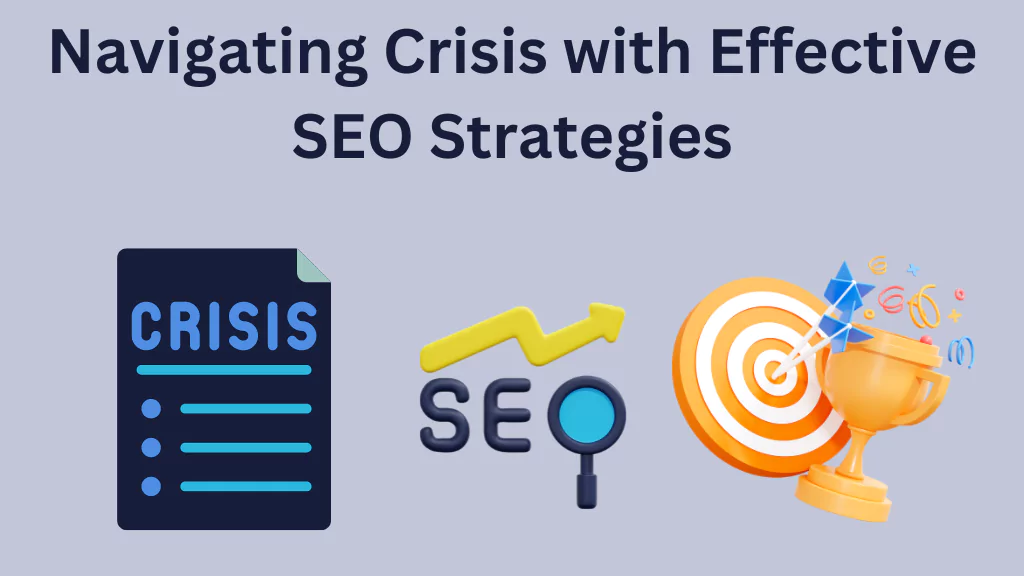Imagine a social media firestorm erupting, negative reviews flooding the web, and your brand name swirling in a sea of misinformation. In today’s digital age, a single misstep can trigger a PR disaster. But what if you could turn the tables? What if you had a secret weapon to not only weather the storm but actually emerge stronger?
This blog post reveals the power of SEO as your crisis management shield. We’ll unveil how to leverage search engines to control the narrative, silence misinformation, and build trust even when the flames are licking high. So buckle up, and get ready to discover the SEO strategies that transform your brand from crisis casualty to digital hero.

Table of Contents
ToggleUnderstanding the Digital Crisis Landscape
A crisis, in the digital age, is any event that significantly and negatively impacts your brand’s online image. It could be a product recall, a data breach, a customer service misstep, or even an unfounded rumor. The key challenge? The speed and reach of online information. Negative news spreads like wildfire, often overshadowing accurate information and leaving your brand struggling to catch up.
This is why proactive crisis management is crucial. Having a plan in place, including an SEO strategy, allows you to react swiftly, mitigate damage, and regain control of the conversation.
SEO: Your Secret Weapon in the Digital Warzone
SEO goes beyond just ranking high on search engines. It’s about influencing what people see when they search for your brand, especially during a crisis. Here’s how:
- Controlling the Narrative: By optimizing your website for relevant crisis-related keywords, you ensure your official response comes up first in search results, pushing down negative press and misinformation.
- Disseminating Accurate Information: Crisis-specific landing pages with clear, factual information address concerns head-on, promoting transparency and building trust.
- Countering Misinformation: Authoritative content that directly addresses rumors and clarifies misconceptions empowers your audience with the truth, minimizing the impact of negativity.
Building a Strong SEO Foundation for Crisis
Before a crisis hits, lay the groundwork for an effective SEO response:
- SEO Audit: Analyze your website and digital assets for SEO strengths and weaknesses, identifying areas for improvement.
- Keyword Research: Research relevant keywords people might use when searching for information related to potential crisis scenarios.
- Crisis Landing Pages: Create pre-populated landing pages with FAQs, updates, and official statements for various crisis types, ready to be activated as needed.
Always on Guard: Monitoring the Digital Landscape
In a crisis, information moves fast, and staying ahead of the curve is paramount. Here’s how SEO tools can help:
- Real-time Monitoring: Utilize SEO tools that track online conversations, brand mentions, and emerging trends related to the crisis. This allows for swift identification and response to negative sentiment or misinformation.
- Search Trend Analysis: Monitor search trends related to the crisis and your brand to understand what people are searching for and address their concerns promptly.
- Social Listening: Actively listen to audience feedback and reactions on social media, adapting your messaging and communication strategies accordingly.
Crafting the Right Message: Compelling Content for Crisis Communication
Content is king, especially during a crisis. Here’s how to create content that resonates:
- Authoritative Voice: Develop content that establishes your brand as a trusted source of information, addressing concerns and providing clear explanations.
- Transparency and Empathy: Craft messages that are transparent, honest, and demonstrate empathy for those impacted by the crisis.
- Accuracy and Timeliness: Ensure information is accurate, up-to-date, and readily accessible through optimized content.
Reputation in the Digital Age: Managing the Aftermath
The fire may be out, but rebuilding trust takes time. Here’s how SEO helps manage online reputation:
- Prompt Response: Respond promptly and transparently to negative feedback and criticisms, demonstrating a commitment to resolving issues.
- Optimizing Positive Content: Optimize positive content like customer testimonials and success stories to suppress negative search results.
- Proactive Reputation Management: Integrate SEO best practices into your overall marketing strategy to maintain a positive online image.
Amplifying Your Voice: SEO-Powered Crisis Communication
SEO extends beyond just your website. Here’s how to reach your audience effectively:
- SEO-Optimized Press Releases: Ensure press releases are optimized for relevant keywords to increase visibility and reach target audiences.
- Social Media Engagement: Utilize social media platforms strategically, sharing optimized content and engaging with stakeholders in relevant conversations.
- Blog Posts and Updates: Publish blog posts and updates on your website, optimized for search engines, to provide ongoing information and address concerns.
Learning from the Ashes: Preparing for the Future
Crisis management is an ongoing process. Here’s how to ensure you’re ready for the next challenge:
- Post-Crisis Analysis: Analyze the effectiveness of your SEO strategy during the crisis, identifying strengths and areas for improvement.
- Update Strategies: Based on your analysis, update your crisis management protocols to incorporate SEO best practices and learned lessons.
- Proactive SEO Preparedness: Integrate SEO into your overall crisis management plan to ensure swift and effective response to future challenges.
FAQs
How can SEO help during a crisis when time is of the essence?
SEO helps streamline information flow, ensuring accurate and relevant information reaches the right people quickly.
What are common mistakes to avoid?
Delaying response, ignoring negative sentiment, and using misleading or inaccurate information can damage your reputation further.
Can SEO mitigate negative press?
SEO can’t erase negativity, but it can help ensure your positive voice is heard and your official information is readily accessible.
How do you measure effectiveness?
Track website traffic, search ranking changes, brand sentiment analysis, and engagement metrics to gauge SEO’s impact.
Are there ethical considerations? manipulation.
Always be transparent, honest, and avoid misleading information. Prioritize user experience and accurate information above mere ranking
Conclusion
In today’s digital world, SEO is not just a marketing tool but a crucial crisis management asset. By proactively building a strong SEO foundation, monitoring the online landscape, and crafting effective content, brands can navigate crises with resilience and emerge stronger. Remember, SEO is a long-term strategy, and by integrating it into your overall crisis management plan, you can ensure your brand is prepared to weather any storm and emerge on the first page of trust and reputation.
Take Action Today!
Don’t wait for a crisis to strike. Start building your SEO foundation today. Conduct an audit, research relevant keywords, and prepare crisis landing pages. By taking these proactive steps, you’ll be equipped to face any challenge with confidence, knowing that SEO is on your side.





